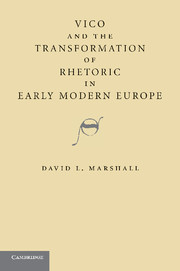7 - Conclusion
Published online by Cambridge University Press: 06 July 2010
Summary
Notoriously, Vico's impact in the history of thought was far from immediate. He was well known at Naples in the eighteenth century, but as the principal figures of the Neapolitan Enlightenment began to theorize the new forms of publicity that they saw emerging in Europe they did not take up his reconfiguration of rhetoric. When they did engage with his work, they perceived a discovery of the feudal mind. This is the conclusion of the Italian historian Franco Venturi, who was instrumental in laying the foundations for a history of the Italian Enlightenment. But, within the canon of Neapolitan reformers recognized by Venturi as important intellectual figures in the development of new ideas in the eighteenth century, the reception of Vico is anemic. This is true, what is more, despite the deep (if not always obvious) connections between the issues taken up by Vico and the issues taken up by his fellow Neapolitans. One finds in Antonio Genovesi (1713–1769), an early leader of Neapolitan reformism and at one time a student of Vico's, the vague admission that man outside society is very weak and that the aggregation of individuals is not merely additive, but multiplicative. Yet Genovesi's gloss of what it means to live in community with others is particularly thin in comparison with the sheer ambition of his projects for Neapolitan self-knowledge.
- Type
- Chapter
- Information
- Vico and the Transformation of Rhetoric in Early Modern Europe , pp. 263 - 278Publisher: Cambridge University PressPrint publication year: 2010



